Choice of Law and Jurisdiction in Employment Contracts
VerifiedAdded on 2019/09/22
|7
|3165
|231
Report
AI Summary
The provided content discusses the application of laws in a contractual dispute between ARGCO, Exec, and USCO. The case involves Exec's alleged breach of employment agreement by sharing JVCO trade secret documentation with USCO without permission. The applicable law is determined to be Argentina law based on the principle of 'lex loci contractus' (law of the place of contracting) since the parties negotiated and performed the contract in Buenos Aires. Similarly, Ms. Femp's sexual harassment claims are also governed by Argentine laws due to the location where the injury occurred.
Contribute Materials
Your contribution can guide someone’s learning journey. Share your
documents today.
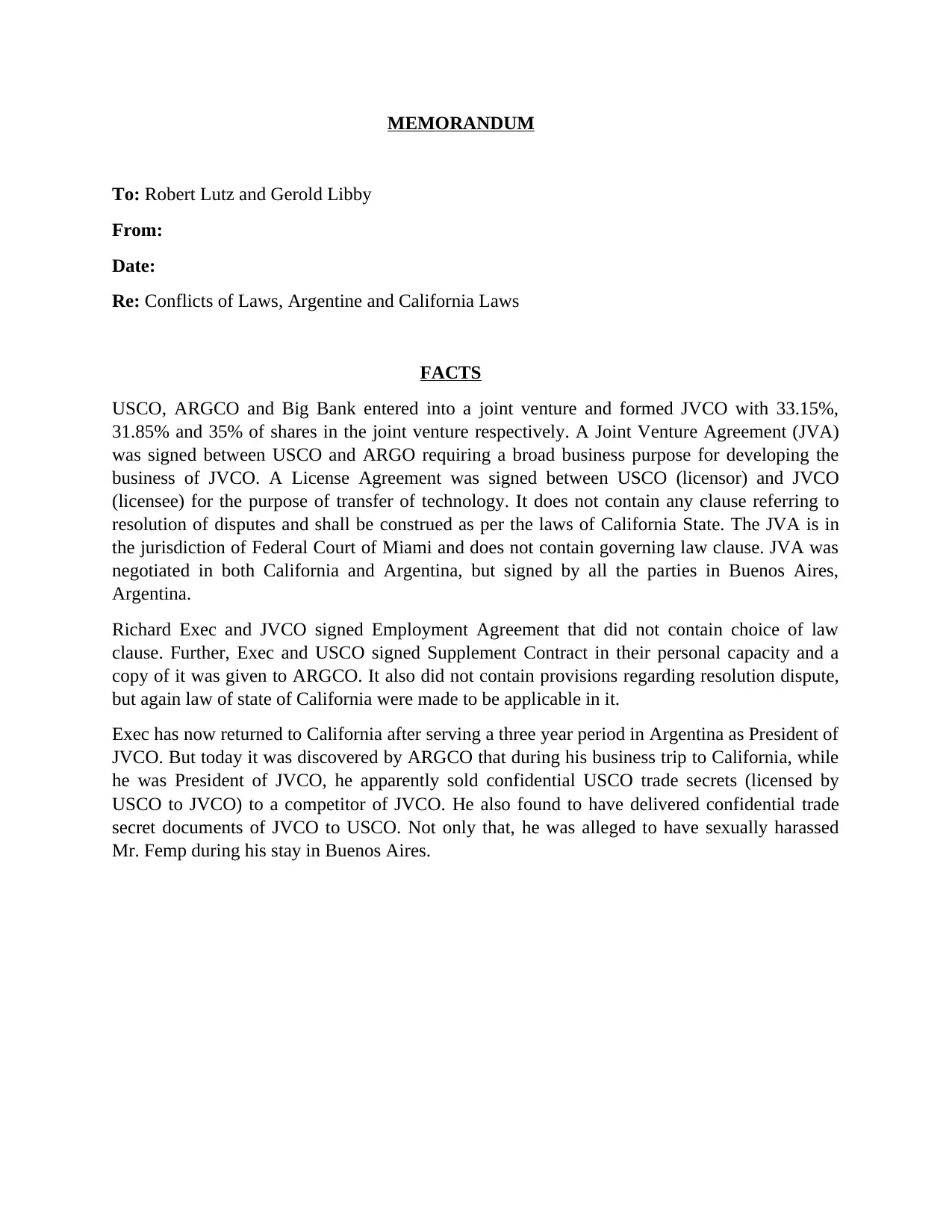
MEMORANDUM
To: Robert Lutz and Gerold Libby
From:
Date:
Re: Conflicts of Laws, Argentine and California Laws
FACTS
USCO, ARGCO and Big Bank entered into a joint venture and formed JVCO with 33.15%,
31.85% and 35% of shares in the joint venture respectively. A Joint Venture Agreement (JVA)
was signed between USCO and ARGO requiring a broad business purpose for developing the
business of JVCO. A License Agreement was signed between USCO (licensor) and JVCO
(licensee) for the purpose of transfer of technology. It does not contain any clause referring to
resolution of disputes and shall be construed as per the laws of California State. The JVA is in
the jurisdiction of Federal Court of Miami and does not contain governing law clause. JVA was
negotiated in both California and Argentina, but signed by all the parties in Buenos Aires,
Argentina.
Richard Exec and JVCO signed Employment Agreement that did not contain choice of law
clause. Further, Exec and USCO signed Supplement Contract in their personal capacity and a
copy of it was given to ARGCO. It also did not contain provisions regarding resolution dispute,
but again law of state of California were made to be applicable in it.
Exec has now returned to California after serving a three year period in Argentina as President of
JVCO. But today it was discovered by ARGCO that during his business trip to California, while
he was President of JVCO, he apparently sold confidential USCO trade secrets (licensed by
USCO to JVCO) to a competitor of JVCO. He also found to have delivered confidential trade
secret documents of JVCO to USCO. Not only that, he was alleged to have sexually harassed
Mr. Femp during his stay in Buenos Aires.
To: Robert Lutz and Gerold Libby
From:
Date:
Re: Conflicts of Laws, Argentine and California Laws
FACTS
USCO, ARGCO and Big Bank entered into a joint venture and formed JVCO with 33.15%,
31.85% and 35% of shares in the joint venture respectively. A Joint Venture Agreement (JVA)
was signed between USCO and ARGO requiring a broad business purpose for developing the
business of JVCO. A License Agreement was signed between USCO (licensor) and JVCO
(licensee) for the purpose of transfer of technology. It does not contain any clause referring to
resolution of disputes and shall be construed as per the laws of California State. The JVA is in
the jurisdiction of Federal Court of Miami and does not contain governing law clause. JVA was
negotiated in both California and Argentina, but signed by all the parties in Buenos Aires,
Argentina.
Richard Exec and JVCO signed Employment Agreement that did not contain choice of law
clause. Further, Exec and USCO signed Supplement Contract in their personal capacity and a
copy of it was given to ARGCO. It also did not contain provisions regarding resolution dispute,
but again law of state of California were made to be applicable in it.
Exec has now returned to California after serving a three year period in Argentina as President of
JVCO. But today it was discovered by ARGCO that during his business trip to California, while
he was President of JVCO, he apparently sold confidential USCO trade secrets (licensed by
USCO to JVCO) to a competitor of JVCO. He also found to have delivered confidential trade
secret documents of JVCO to USCO. Not only that, he was alleged to have sexually harassed
Mr. Femp during his stay in Buenos Aires.
Secure Best Marks with AI Grader
Need help grading? Try our AI Grader for instant feedback on your assignments.
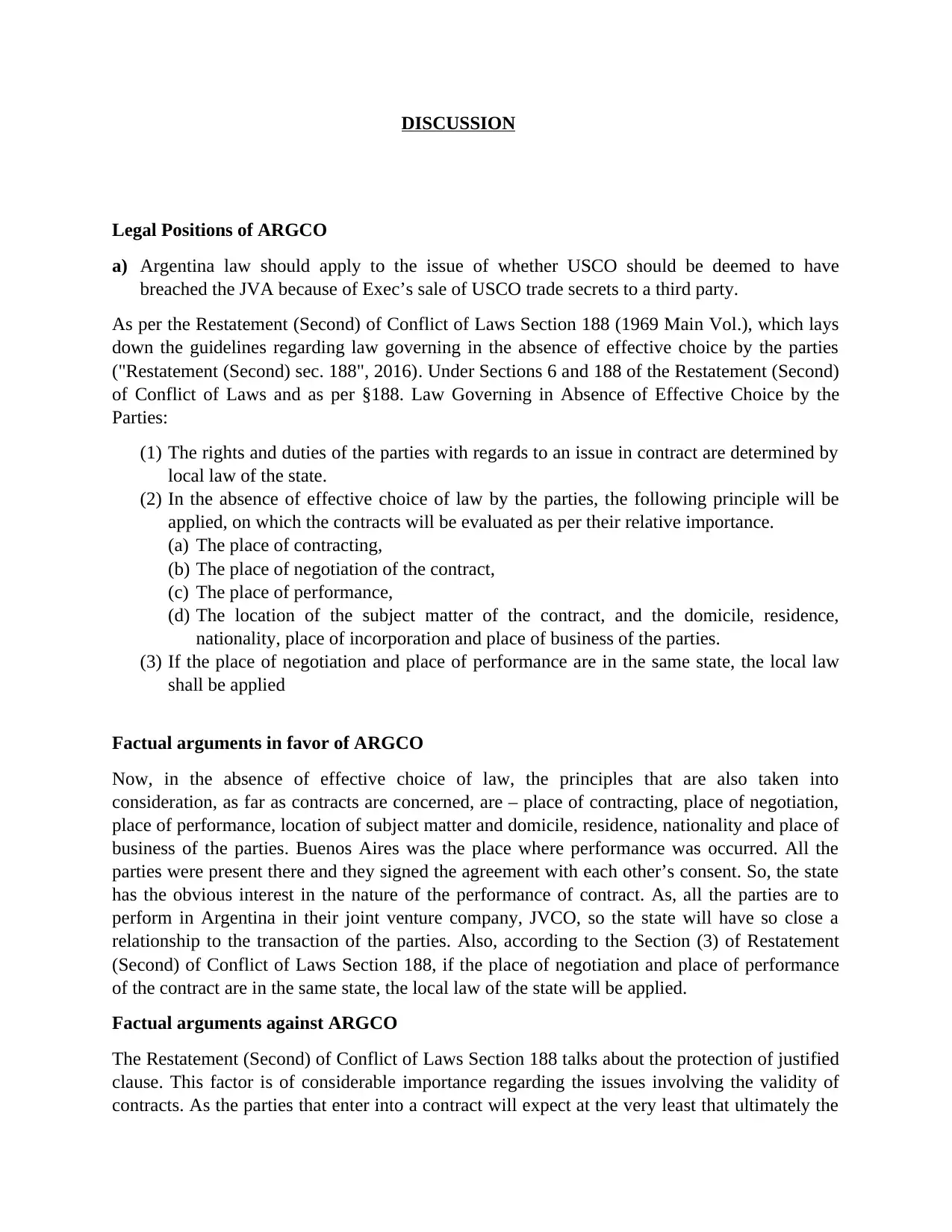
DISCUSSION
Legal Positions of ARGCO
a) Argentina law should apply to the issue of whether USCO should be deemed to have
breached the JVA because of Exec’s sale of USCO trade secrets to a third party.
As per the Restatement (Second) of Conflict of Laws Section 188 (1969 Main Vol.), which lays
down the guidelines regarding law governing in the absence of effective choice by the parties
("Restatement (Second) sec. 188", 2016). Under Sections 6 and 188 of the Restatement (Second)
of Conflict of Laws and as per §188. Law Governing in Absence of Effective Choice by the
Parties:
(1) The rights and duties of the parties with regards to an issue in contract are determined by
local law of the state.
(2) In the absence of effective choice of law by the parties, the following principle will be
applied, on which the contracts will be evaluated as per their relative importance.
(a) The place of contracting,
(b) The place of negotiation of the contract,
(c) The place of performance,
(d) The location of the subject matter of the contract, and the domicile, residence,
nationality, place of incorporation and place of business of the parties.
(3) If the place of negotiation and place of performance are in the same state, the local law
shall be applied
Factual arguments in favor of ARGCO
Now, in the absence of effective choice of law, the principles that are also taken into
consideration, as far as contracts are concerned, are – place of contracting, place of negotiation,
place of performance, location of subject matter and domicile, residence, nationality and place of
business of the parties. Buenos Aires was the place where performance was occurred. All the
parties were present there and they signed the agreement with each other’s consent. So, the state
has the obvious interest in the nature of the performance of contract. As, all the parties are to
perform in Argentina in their joint venture company, JVCO, so the state will have so close a
relationship to the transaction of the parties. Also, according to the Section (3) of Restatement
(Second) of Conflict of Laws Section 188, if the place of negotiation and place of performance
of the contract are in the same state, the local law of the state will be applied.
Factual arguments against ARGCO
The Restatement (Second) of Conflict of Laws Section 188 talks about the protection of justified
clause. This factor is of considerable importance regarding the issues involving the validity of
contracts. As the parties that enter into a contract will expect at the very least that ultimately the
Legal Positions of ARGCO
a) Argentina law should apply to the issue of whether USCO should be deemed to have
breached the JVA because of Exec’s sale of USCO trade secrets to a third party.
As per the Restatement (Second) of Conflict of Laws Section 188 (1969 Main Vol.), which lays
down the guidelines regarding law governing in the absence of effective choice by the parties
("Restatement (Second) sec. 188", 2016). Under Sections 6 and 188 of the Restatement (Second)
of Conflict of Laws and as per §188. Law Governing in Absence of Effective Choice by the
Parties:
(1) The rights and duties of the parties with regards to an issue in contract are determined by
local law of the state.
(2) In the absence of effective choice of law by the parties, the following principle will be
applied, on which the contracts will be evaluated as per their relative importance.
(a) The place of contracting,
(b) The place of negotiation of the contract,
(c) The place of performance,
(d) The location of the subject matter of the contract, and the domicile, residence,
nationality, place of incorporation and place of business of the parties.
(3) If the place of negotiation and place of performance are in the same state, the local law
shall be applied
Factual arguments in favor of ARGCO
Now, in the absence of effective choice of law, the principles that are also taken into
consideration, as far as contracts are concerned, are – place of contracting, place of negotiation,
place of performance, location of subject matter and domicile, residence, nationality and place of
business of the parties. Buenos Aires was the place where performance was occurred. All the
parties were present there and they signed the agreement with each other’s consent. So, the state
has the obvious interest in the nature of the performance of contract. As, all the parties are to
perform in Argentina in their joint venture company, JVCO, so the state will have so close a
relationship to the transaction of the parties. Also, according to the Section (3) of Restatement
(Second) of Conflict of Laws Section 188, if the place of negotiation and place of performance
of the contract are in the same state, the local law of the state will be applied.
Factual arguments against ARGCO
The Restatement (Second) of Conflict of Laws Section 188 talks about the protection of justified
clause. This factor is of considerable importance regarding the issues involving the validity of
contracts. As the parties that enter into a contract will expect at the very least that ultimately the
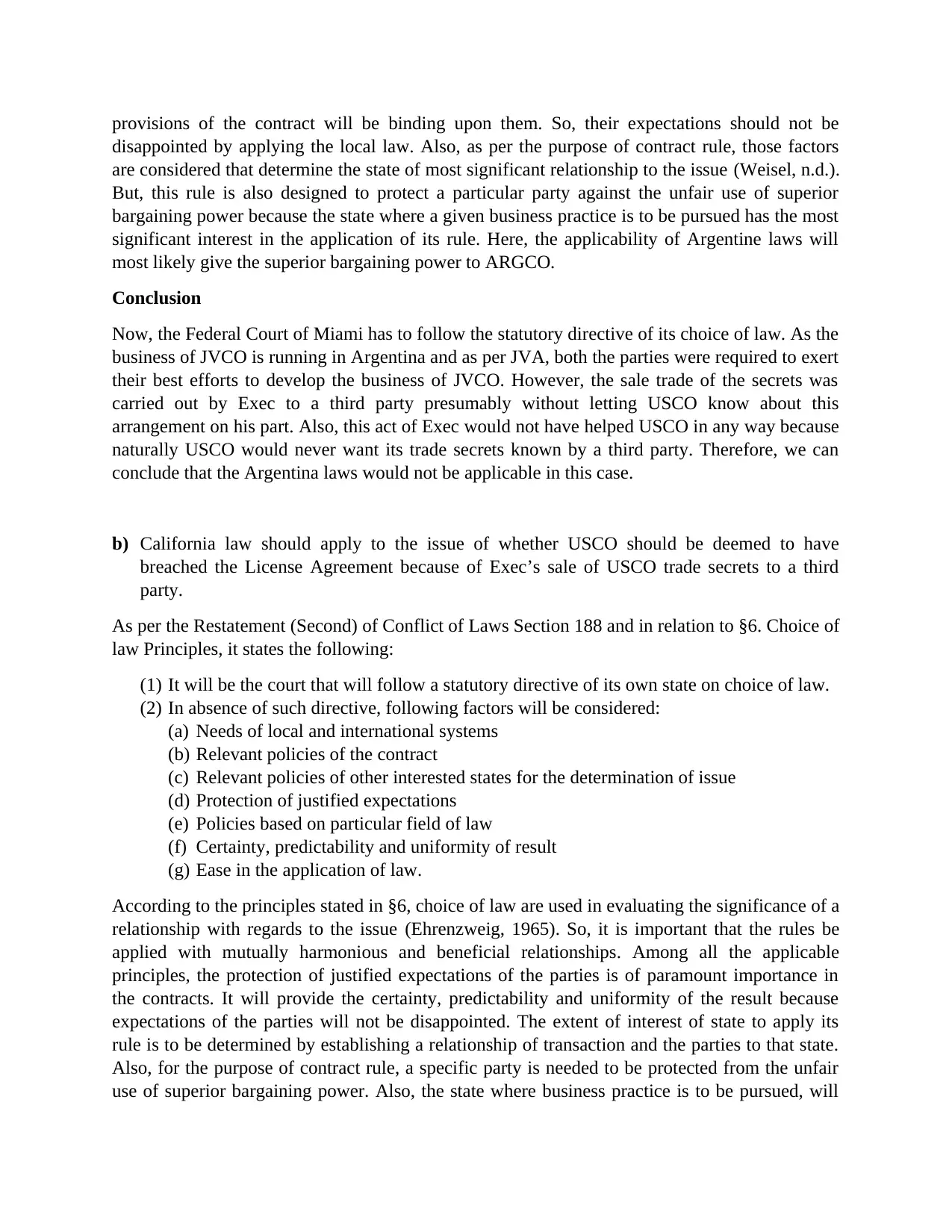
provisions of the contract will be binding upon them. So, their expectations should not be
disappointed by applying the local law. Also, as per the purpose of contract rule, those factors
are considered that determine the state of most significant relationship to the issue (Weisel, n.d.).
But, this rule is also designed to protect a particular party against the unfair use of superior
bargaining power because the state where a given business practice is to be pursued has the most
significant interest in the application of its rule. Here, the applicability of Argentine laws will
most likely give the superior bargaining power to ARGCO.
Conclusion
Now, the Federal Court of Miami has to follow the statutory directive of its choice of law. As the
business of JVCO is running in Argentina and as per JVA, both the parties were required to exert
their best efforts to develop the business of JVCO. However, the sale trade of the secrets was
carried out by Exec to a third party presumably without letting USCO know about this
arrangement on his part. Also, this act of Exec would not have helped USCO in any way because
naturally USCO would never want its trade secrets known by a third party. Therefore, we can
conclude that the Argentina laws would not be applicable in this case.
b) California law should apply to the issue of whether USCO should be deemed to have
breached the License Agreement because of Exec’s sale of USCO trade secrets to a third
party.
As per the Restatement (Second) of Conflict of Laws Section 188 and in relation to §6. Choice of
law Principles, it states the following:
(1) It will be the court that will follow a statutory directive of its own state on choice of law.
(2) In absence of such directive, following factors will be considered:
(a) Needs of local and international systems
(b) Relevant policies of the contract
(c) Relevant policies of other interested states for the determination of issue
(d) Protection of justified expectations
(e) Policies based on particular field of law
(f) Certainty, predictability and uniformity of result
(g) Ease in the application of law.
According to the principles stated in §6, choice of law are used in evaluating the significance of a
relationship with regards to the issue (Ehrenzweig, 1965). So, it is important that the rules be
applied with mutually harmonious and beneficial relationships. Among all the applicable
principles, the protection of justified expectations of the parties is of paramount importance in
the contracts. It will provide the certainty, predictability and uniformity of the result because
expectations of the parties will not be disappointed. The extent of interest of state to apply its
rule is to be determined by establishing a relationship of transaction and the parties to that state.
Also, for the purpose of contract rule, a specific party is needed to be protected from the unfair
use of superior bargaining power. Also, the state where business practice is to be pursued, will
disappointed by applying the local law. Also, as per the purpose of contract rule, those factors
are considered that determine the state of most significant relationship to the issue (Weisel, n.d.).
But, this rule is also designed to protect a particular party against the unfair use of superior
bargaining power because the state where a given business practice is to be pursued has the most
significant interest in the application of its rule. Here, the applicability of Argentine laws will
most likely give the superior bargaining power to ARGCO.
Conclusion
Now, the Federal Court of Miami has to follow the statutory directive of its choice of law. As the
business of JVCO is running in Argentina and as per JVA, both the parties were required to exert
their best efforts to develop the business of JVCO. However, the sale trade of the secrets was
carried out by Exec to a third party presumably without letting USCO know about this
arrangement on his part. Also, this act of Exec would not have helped USCO in any way because
naturally USCO would never want its trade secrets known by a third party. Therefore, we can
conclude that the Argentina laws would not be applicable in this case.
b) California law should apply to the issue of whether USCO should be deemed to have
breached the License Agreement because of Exec’s sale of USCO trade secrets to a third
party.
As per the Restatement (Second) of Conflict of Laws Section 188 and in relation to §6. Choice of
law Principles, it states the following:
(1) It will be the court that will follow a statutory directive of its own state on choice of law.
(2) In absence of such directive, following factors will be considered:
(a) Needs of local and international systems
(b) Relevant policies of the contract
(c) Relevant policies of other interested states for the determination of issue
(d) Protection of justified expectations
(e) Policies based on particular field of law
(f) Certainty, predictability and uniformity of result
(g) Ease in the application of law.
According to the principles stated in §6, choice of law are used in evaluating the significance of a
relationship with regards to the issue (Ehrenzweig, 1965). So, it is important that the rules be
applied with mutually harmonious and beneficial relationships. Among all the applicable
principles, the protection of justified expectations of the parties is of paramount importance in
the contracts. It will provide the certainty, predictability and uniformity of the result because
expectations of the parties will not be disappointed. The extent of interest of state to apply its
rule is to be determined by establishing a relationship of transaction and the parties to that state.
Also, for the purpose of contract rule, a specific party is needed to be protected from the unfair
use of superior bargaining power. Also, the state where business practice is to be pursued, will
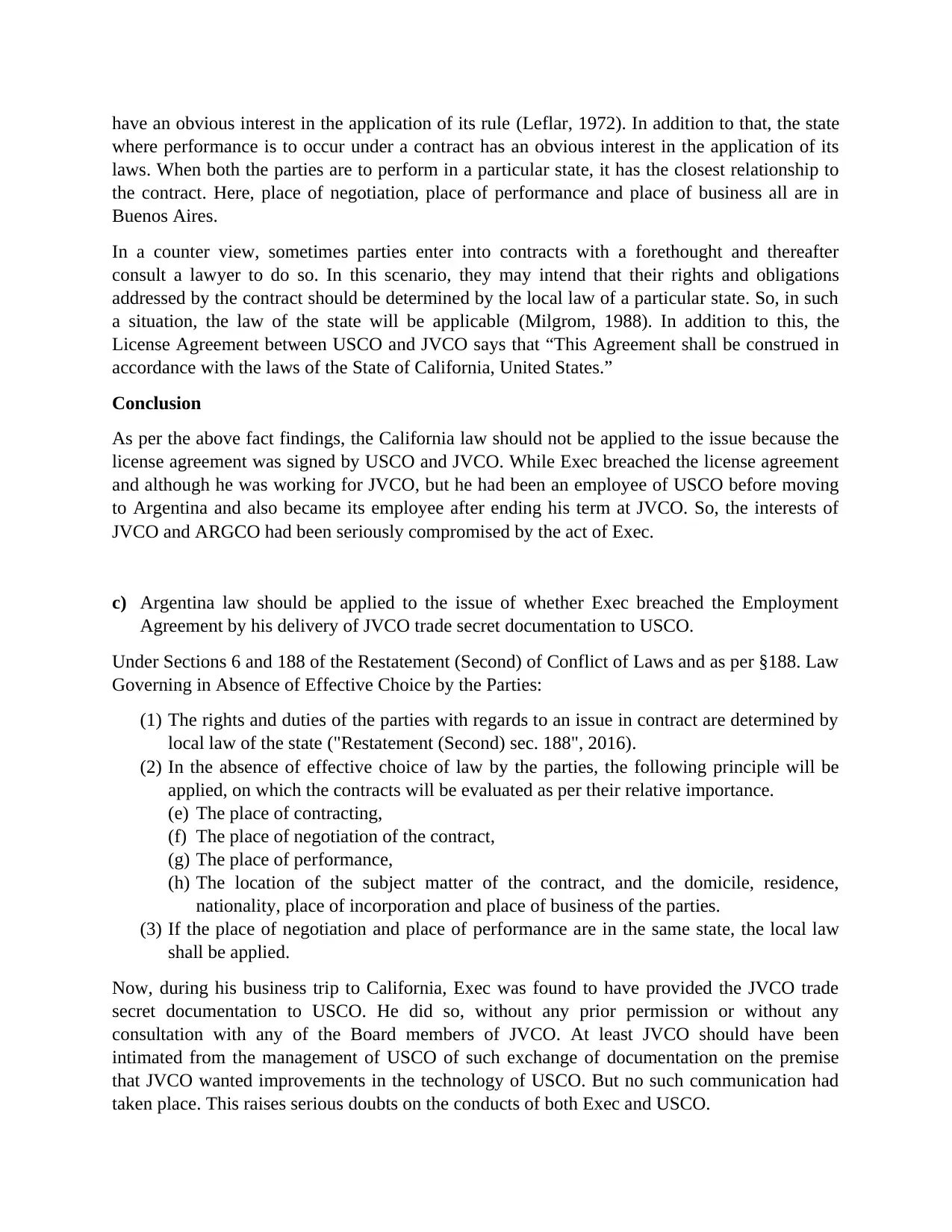
have an obvious interest in the application of its rule (Leflar, 1972). In addition to that, the state
where performance is to occur under a contract has an obvious interest in the application of its
laws. When both the parties are to perform in a particular state, it has the closest relationship to
the contract. Here, place of negotiation, place of performance and place of business all are in
Buenos Aires.
In a counter view, sometimes parties enter into contracts with a forethought and thereafter
consult a lawyer to do so. In this scenario, they may intend that their rights and obligations
addressed by the contract should be determined by the local law of a particular state. So, in such
a situation, the law of the state will be applicable (Milgrom, 1988). In addition to this, the
License Agreement between USCO and JVCO says that “This Agreement shall be construed in
accordance with the laws of the State of California, United States.”
Conclusion
As per the above fact findings, the California law should not be applied to the issue because the
license agreement was signed by USCO and JVCO. While Exec breached the license agreement
and although he was working for JVCO, but he had been an employee of USCO before moving
to Argentina and also became its employee after ending his term at JVCO. So, the interests of
JVCO and ARGCO had been seriously compromised by the act of Exec.
c) Argentina law should be applied to the issue of whether Exec breached the Employment
Agreement by his delivery of JVCO trade secret documentation to USCO.
Under Sections 6 and 188 of the Restatement (Second) of Conflict of Laws and as per §188. Law
Governing in Absence of Effective Choice by the Parties:
(1) The rights and duties of the parties with regards to an issue in contract are determined by
local law of the state ("Restatement (Second) sec. 188", 2016).
(2) In the absence of effective choice of law by the parties, the following principle will be
applied, on which the contracts will be evaluated as per their relative importance.
(e) The place of contracting,
(f) The place of negotiation of the contract,
(g) The place of performance,
(h) The location of the subject matter of the contract, and the domicile, residence,
nationality, place of incorporation and place of business of the parties.
(3) If the place of negotiation and place of performance are in the same state, the local law
shall be applied.
Now, during his business trip to California, Exec was found to have provided the JVCO trade
secret documentation to USCO. He did so, without any prior permission or without any
consultation with any of the Board members of JVCO. At least JVCO should have been
intimated from the management of USCO of such exchange of documentation on the premise
that JVCO wanted improvements in the technology of USCO. But no such communication had
taken place. This raises serious doubts on the conducts of both Exec and USCO.
where performance is to occur under a contract has an obvious interest in the application of its
laws. When both the parties are to perform in a particular state, it has the closest relationship to
the contract. Here, place of negotiation, place of performance and place of business all are in
Buenos Aires.
In a counter view, sometimes parties enter into contracts with a forethought and thereafter
consult a lawyer to do so. In this scenario, they may intend that their rights and obligations
addressed by the contract should be determined by the local law of a particular state. So, in such
a situation, the law of the state will be applicable (Milgrom, 1988). In addition to this, the
License Agreement between USCO and JVCO says that “This Agreement shall be construed in
accordance with the laws of the State of California, United States.”
Conclusion
As per the above fact findings, the California law should not be applied to the issue because the
license agreement was signed by USCO and JVCO. While Exec breached the license agreement
and although he was working for JVCO, but he had been an employee of USCO before moving
to Argentina and also became its employee after ending his term at JVCO. So, the interests of
JVCO and ARGCO had been seriously compromised by the act of Exec.
c) Argentina law should be applied to the issue of whether Exec breached the Employment
Agreement by his delivery of JVCO trade secret documentation to USCO.
Under Sections 6 and 188 of the Restatement (Second) of Conflict of Laws and as per §188. Law
Governing in Absence of Effective Choice by the Parties:
(1) The rights and duties of the parties with regards to an issue in contract are determined by
local law of the state ("Restatement (Second) sec. 188", 2016).
(2) In the absence of effective choice of law by the parties, the following principle will be
applied, on which the contracts will be evaluated as per their relative importance.
(e) The place of contracting,
(f) The place of negotiation of the contract,
(g) The place of performance,
(h) The location of the subject matter of the contract, and the domicile, residence,
nationality, place of incorporation and place of business of the parties.
(3) If the place of negotiation and place of performance are in the same state, the local law
shall be applied.
Now, during his business trip to California, Exec was found to have provided the JVCO trade
secret documentation to USCO. He did so, without any prior permission or without any
consultation with any of the Board members of JVCO. At least JVCO should have been
intimated from the management of USCO of such exchange of documentation on the premise
that JVCO wanted improvements in the technology of USCO. But no such communication had
taken place. This raises serious doubts on the conducts of both Exec and USCO.
Paraphrase This Document
Need a fresh take? Get an instant paraphrase of this document with our AI Paraphraser
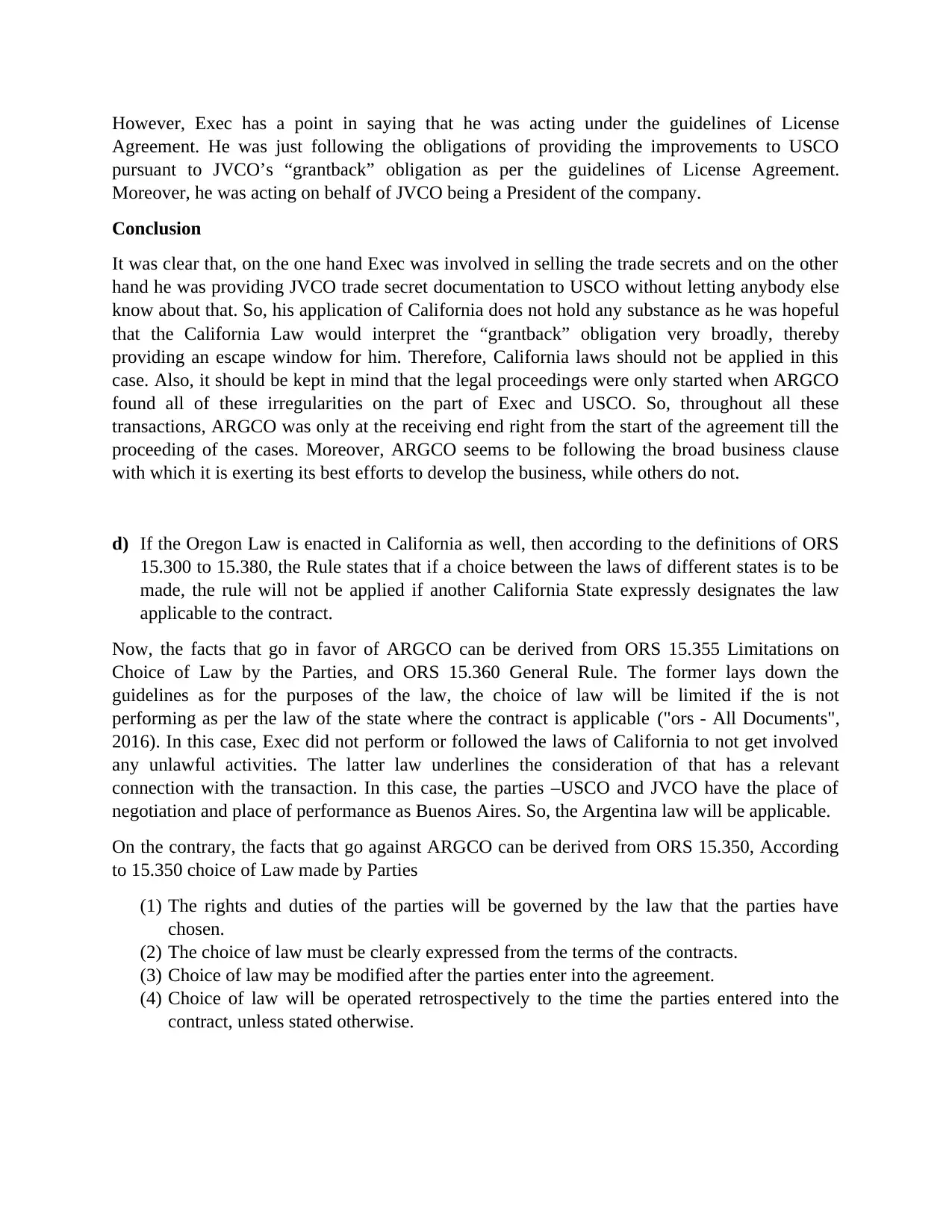
However, Exec has a point in saying that he was acting under the guidelines of License
Agreement. He was just following the obligations of providing the improvements to USCO
pursuant to JVCO’s “grantback” obligation as per the guidelines of License Agreement.
Moreover, he was acting on behalf of JVCO being a President of the company.
Conclusion
It was clear that, on the one hand Exec was involved in selling the trade secrets and on the other
hand he was providing JVCO trade secret documentation to USCO without letting anybody else
know about that. So, his application of California does not hold any substance as he was hopeful
that the California Law would interpret the “grantback” obligation very broadly, thereby
providing an escape window for him. Therefore, California laws should not be applied in this
case. Also, it should be kept in mind that the legal proceedings were only started when ARGCO
found all of these irregularities on the part of Exec and USCO. So, throughout all these
transactions, ARGCO was only at the receiving end right from the start of the agreement till the
proceeding of the cases. Moreover, ARGCO seems to be following the broad business clause
with which it is exerting its best efforts to develop the business, while others do not.
d) If the Oregon Law is enacted in California as well, then according to the definitions of ORS
15.300 to 15.380, the Rule states that if a choice between the laws of different states is to be
made, the rule will not be applied if another California State expressly designates the law
applicable to the contract.
Now, the facts that go in favor of ARGCO can be derived from ORS 15.355 Limitations on
Choice of Law by the Parties, and ORS 15.360 General Rule. The former lays down the
guidelines as for the purposes of the law, the choice of law will be limited if the is not
performing as per the law of the state where the contract is applicable ("ors - All Documents",
2016). In this case, Exec did not perform or followed the laws of California to not get involved
any unlawful activities. The latter law underlines the consideration of that has a relevant
connection with the transaction. In this case, the parties –USCO and JVCO have the place of
negotiation and place of performance as Buenos Aires. So, the Argentina law will be applicable.
On the contrary, the facts that go against ARGCO can be derived from ORS 15.350, According
to 15.350 choice of Law made by Parties
(1) The rights and duties of the parties will be governed by the law that the parties have
chosen.
(2) The choice of law must be clearly expressed from the terms of the contracts.
(3) Choice of law may be modified after the parties enter into the agreement.
(4) Choice of law will be operated retrospectively to the time the parties entered into the
contract, unless stated otherwise.
Agreement. He was just following the obligations of providing the improvements to USCO
pursuant to JVCO’s “grantback” obligation as per the guidelines of License Agreement.
Moreover, he was acting on behalf of JVCO being a President of the company.
Conclusion
It was clear that, on the one hand Exec was involved in selling the trade secrets and on the other
hand he was providing JVCO trade secret documentation to USCO without letting anybody else
know about that. So, his application of California does not hold any substance as he was hopeful
that the California Law would interpret the “grantback” obligation very broadly, thereby
providing an escape window for him. Therefore, California laws should not be applied in this
case. Also, it should be kept in mind that the legal proceedings were only started when ARGCO
found all of these irregularities on the part of Exec and USCO. So, throughout all these
transactions, ARGCO was only at the receiving end right from the start of the agreement till the
proceeding of the cases. Moreover, ARGCO seems to be following the broad business clause
with which it is exerting its best efforts to develop the business, while others do not.
d) If the Oregon Law is enacted in California as well, then according to the definitions of ORS
15.300 to 15.380, the Rule states that if a choice between the laws of different states is to be
made, the rule will not be applied if another California State expressly designates the law
applicable to the contract.
Now, the facts that go in favor of ARGCO can be derived from ORS 15.355 Limitations on
Choice of Law by the Parties, and ORS 15.360 General Rule. The former lays down the
guidelines as for the purposes of the law, the choice of law will be limited if the is not
performing as per the law of the state where the contract is applicable ("ors - All Documents",
2016). In this case, Exec did not perform or followed the laws of California to not get involved
any unlawful activities. The latter law underlines the consideration of that has a relevant
connection with the transaction. In this case, the parties –USCO and JVCO have the place of
negotiation and place of performance as Buenos Aires. So, the Argentina law will be applicable.
On the contrary, the facts that go against ARGCO can be derived from ORS 15.350, According
to 15.350 choice of Law made by Parties
(1) The rights and duties of the parties will be governed by the law that the parties have
chosen.
(2) The choice of law must be clearly expressed from the terms of the contracts.
(3) Choice of law may be modified after the parties enter into the agreement.
(4) Choice of law will be operated retrospectively to the time the parties entered into the
contract, unless stated otherwise.
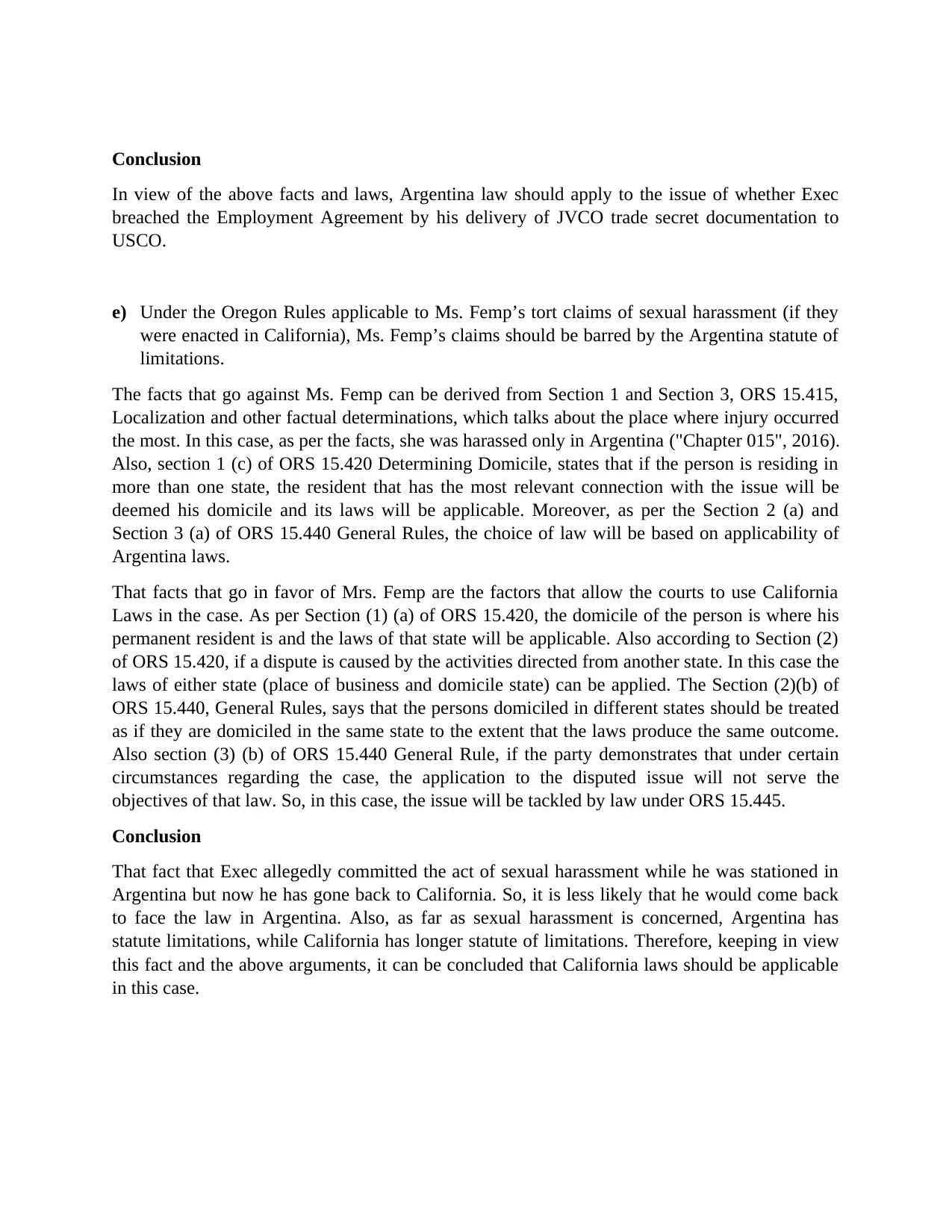
Conclusion
In view of the above facts and laws, Argentina law should apply to the issue of whether Exec
breached the Employment Agreement by his delivery of JVCO trade secret documentation to
USCO.
e) Under the Oregon Rules applicable to Ms. Femp’s tort claims of sexual harassment (if they
were enacted in California), Ms. Femp’s claims should be barred by the Argentina statute of
limitations.
The facts that go against Ms. Femp can be derived from Section 1 and Section 3, ORS 15.415,
Localization and other factual determinations, which talks about the place where injury occurred
the most. In this case, as per the facts, she was harassed only in Argentina ("Chapter 015", 2016).
Also, section 1 (c) of ORS 15.420 Determining Domicile, states that if the person is residing in
more than one state, the resident that has the most relevant connection with the issue will be
deemed his domicile and its laws will be applicable. Moreover, as per the Section 2 (a) and
Section 3 (a) of ORS 15.440 General Rules, the choice of law will be based on applicability of
Argentina laws.
That facts that go in favor of Mrs. Femp are the factors that allow the courts to use California
Laws in the case. As per Section (1) (a) of ORS 15.420, the domicile of the person is where his
permanent resident is and the laws of that state will be applicable. Also according to Section (2)
of ORS 15.420, if a dispute is caused by the activities directed from another state. In this case the
laws of either state (place of business and domicile state) can be applied. The Section (2)(b) of
ORS 15.440, General Rules, says that the persons domiciled in different states should be treated
as if they are domiciled in the same state to the extent that the laws produce the same outcome.
Also section (3) (b) of ORS 15.440 General Rule, if the party demonstrates that under certain
circumstances regarding the case, the application to the disputed issue will not serve the
objectives of that law. So, in this case, the issue will be tackled by law under ORS 15.445.
Conclusion
That fact that Exec allegedly committed the act of sexual harassment while he was stationed in
Argentina but now he has gone back to California. So, it is less likely that he would come back
to face the law in Argentina. Also, as far as sexual harassment is concerned, Argentina has
statute limitations, while California has longer statute of limitations. Therefore, keeping in view
this fact and the above arguments, it can be concluded that California laws should be applicable
in this case.
In view of the above facts and laws, Argentina law should apply to the issue of whether Exec
breached the Employment Agreement by his delivery of JVCO trade secret documentation to
USCO.
e) Under the Oregon Rules applicable to Ms. Femp’s tort claims of sexual harassment (if they
were enacted in California), Ms. Femp’s claims should be barred by the Argentina statute of
limitations.
The facts that go against Ms. Femp can be derived from Section 1 and Section 3, ORS 15.415,
Localization and other factual determinations, which talks about the place where injury occurred
the most. In this case, as per the facts, she was harassed only in Argentina ("Chapter 015", 2016).
Also, section 1 (c) of ORS 15.420 Determining Domicile, states that if the person is residing in
more than one state, the resident that has the most relevant connection with the issue will be
deemed his domicile and its laws will be applicable. Moreover, as per the Section 2 (a) and
Section 3 (a) of ORS 15.440 General Rules, the choice of law will be based on applicability of
Argentina laws.
That facts that go in favor of Mrs. Femp are the factors that allow the courts to use California
Laws in the case. As per Section (1) (a) of ORS 15.420, the domicile of the person is where his
permanent resident is and the laws of that state will be applicable. Also according to Section (2)
of ORS 15.420, if a dispute is caused by the activities directed from another state. In this case the
laws of either state (place of business and domicile state) can be applied. The Section (2)(b) of
ORS 15.440, General Rules, says that the persons domiciled in different states should be treated
as if they are domiciled in the same state to the extent that the laws produce the same outcome.
Also section (3) (b) of ORS 15.440 General Rule, if the party demonstrates that under certain
circumstances regarding the case, the application to the disputed issue will not serve the
objectives of that law. So, in this case, the issue will be tackled by law under ORS 15.445.
Conclusion
That fact that Exec allegedly committed the act of sexual harassment while he was stationed in
Argentina but now he has gone back to California. So, it is less likely that he would come back
to face the law in Argentina. Also, as far as sexual harassment is concerned, Argentina has
statute limitations, while California has longer statute of limitations. Therefore, keeping in view
this fact and the above arguments, it can be concluded that California laws should be applicable
in this case.
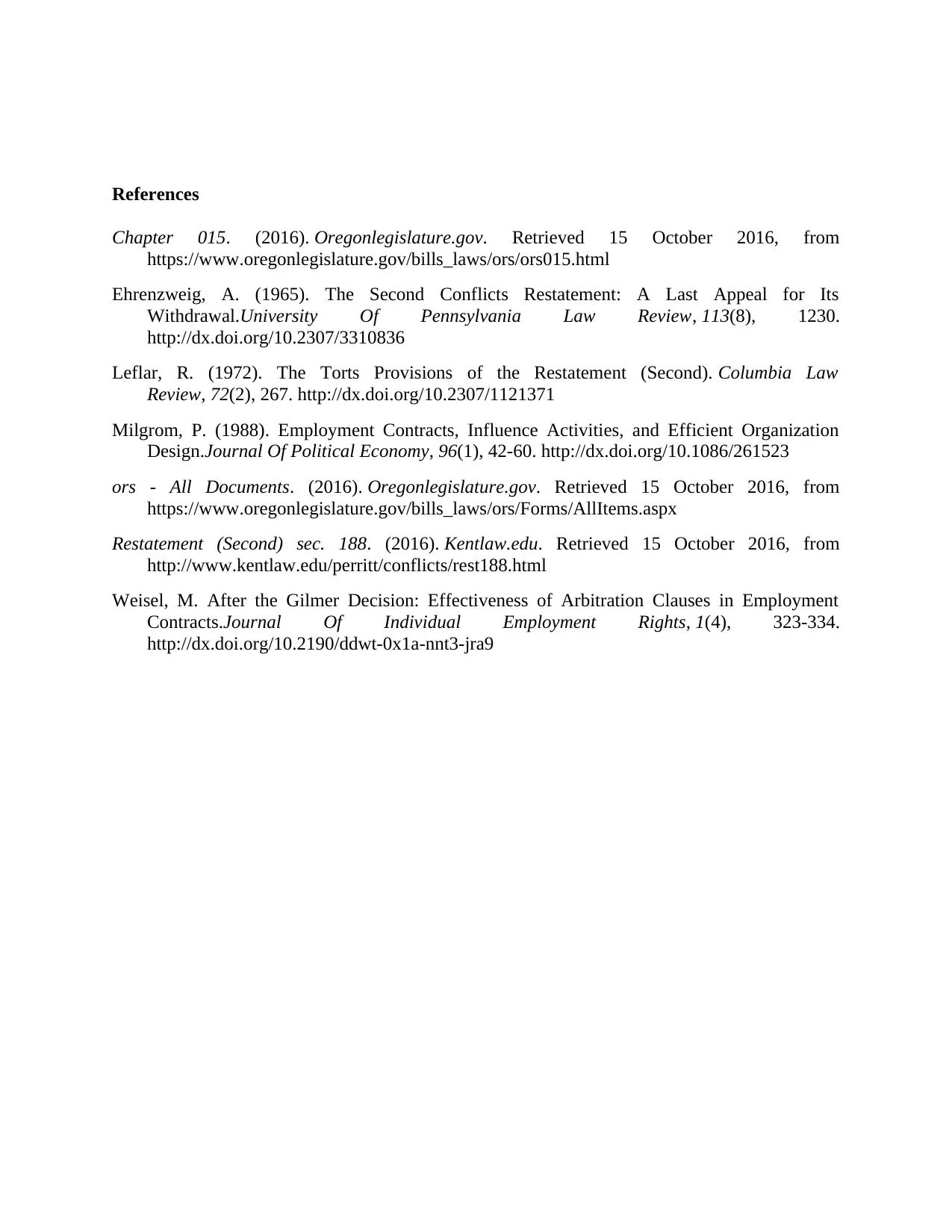
References
Chapter 015. (2016). Oregonlegislature.gov. Retrieved 15 October 2016, from
https://www.oregonlegislature.gov/bills_laws/ors/ors015.html
Ehrenzweig, A. (1965). The Second Conflicts Restatement: A Last Appeal for Its
Withdrawal.University Of Pennsylvania Law Review, 113(8), 1230.
http://dx.doi.org/10.2307/3310836
Leflar, R. (1972). The Torts Provisions of the Restatement (Second). Columbia Law
Review, 72(2), 267. http://dx.doi.org/10.2307/1121371
Milgrom, P. (1988). Employment Contracts, Influence Activities, and Efficient Organization
Design.Journal Of Political Economy, 96(1), 42-60. http://dx.doi.org/10.1086/261523
ors - All Documents. (2016). Oregonlegislature.gov. Retrieved 15 October 2016, from
https://www.oregonlegislature.gov/bills_laws/ors/Forms/AllItems.aspx
Restatement (Second) sec. 188. (2016). Kentlaw.edu. Retrieved 15 October 2016, from
http://www.kentlaw.edu/perritt/conflicts/rest188.html
Weisel, M. After the Gilmer Decision: Effectiveness of Arbitration Clauses in Employment
Contracts.Journal Of Individual Employment Rights, 1(4), 323-334.
http://dx.doi.org/10.2190/ddwt-0x1a-nnt3-jra9
Chapter 015. (2016). Oregonlegislature.gov. Retrieved 15 October 2016, from
https://www.oregonlegislature.gov/bills_laws/ors/ors015.html
Ehrenzweig, A. (1965). The Second Conflicts Restatement: A Last Appeal for Its
Withdrawal.University Of Pennsylvania Law Review, 113(8), 1230.
http://dx.doi.org/10.2307/3310836
Leflar, R. (1972). The Torts Provisions of the Restatement (Second). Columbia Law
Review, 72(2), 267. http://dx.doi.org/10.2307/1121371
Milgrom, P. (1988). Employment Contracts, Influence Activities, and Efficient Organization
Design.Journal Of Political Economy, 96(1), 42-60. http://dx.doi.org/10.1086/261523
ors - All Documents. (2016). Oregonlegislature.gov. Retrieved 15 October 2016, from
https://www.oregonlegislature.gov/bills_laws/ors/Forms/AllItems.aspx
Restatement (Second) sec. 188. (2016). Kentlaw.edu. Retrieved 15 October 2016, from
http://www.kentlaw.edu/perritt/conflicts/rest188.html
Weisel, M. After the Gilmer Decision: Effectiveness of Arbitration Clauses in Employment
Contracts.Journal Of Individual Employment Rights, 1(4), 323-334.
http://dx.doi.org/10.2190/ddwt-0x1a-nnt3-jra9
1 out of 7
![[object Object]](/_next/static/media/star-bottom.7253800d.svg)





